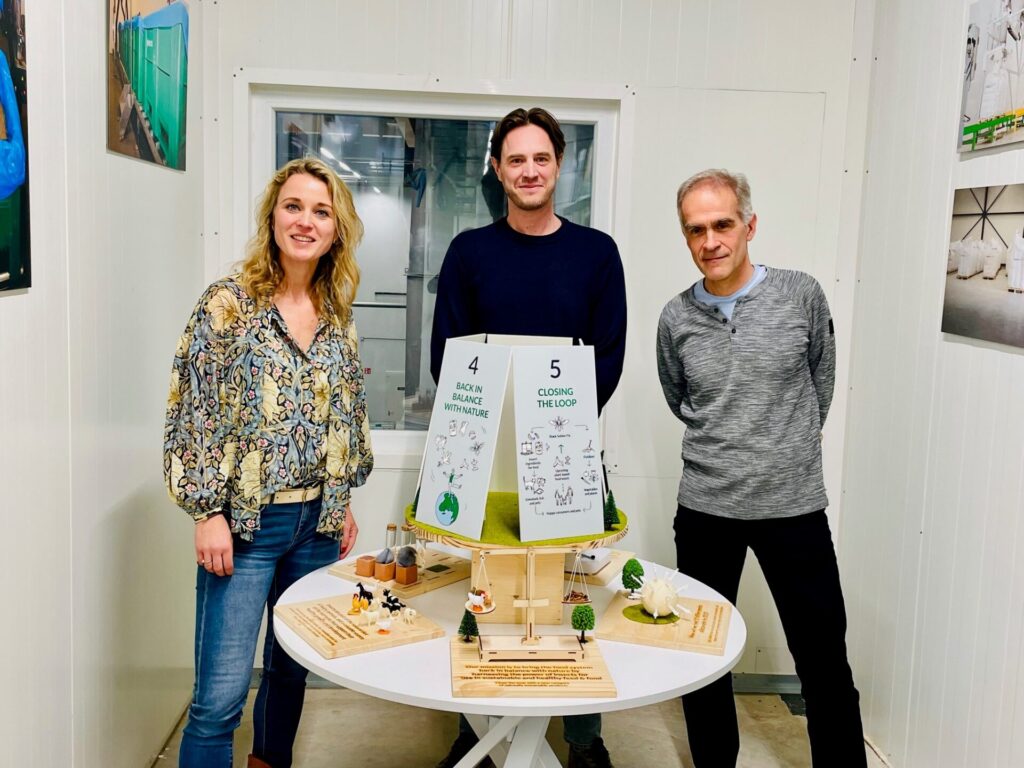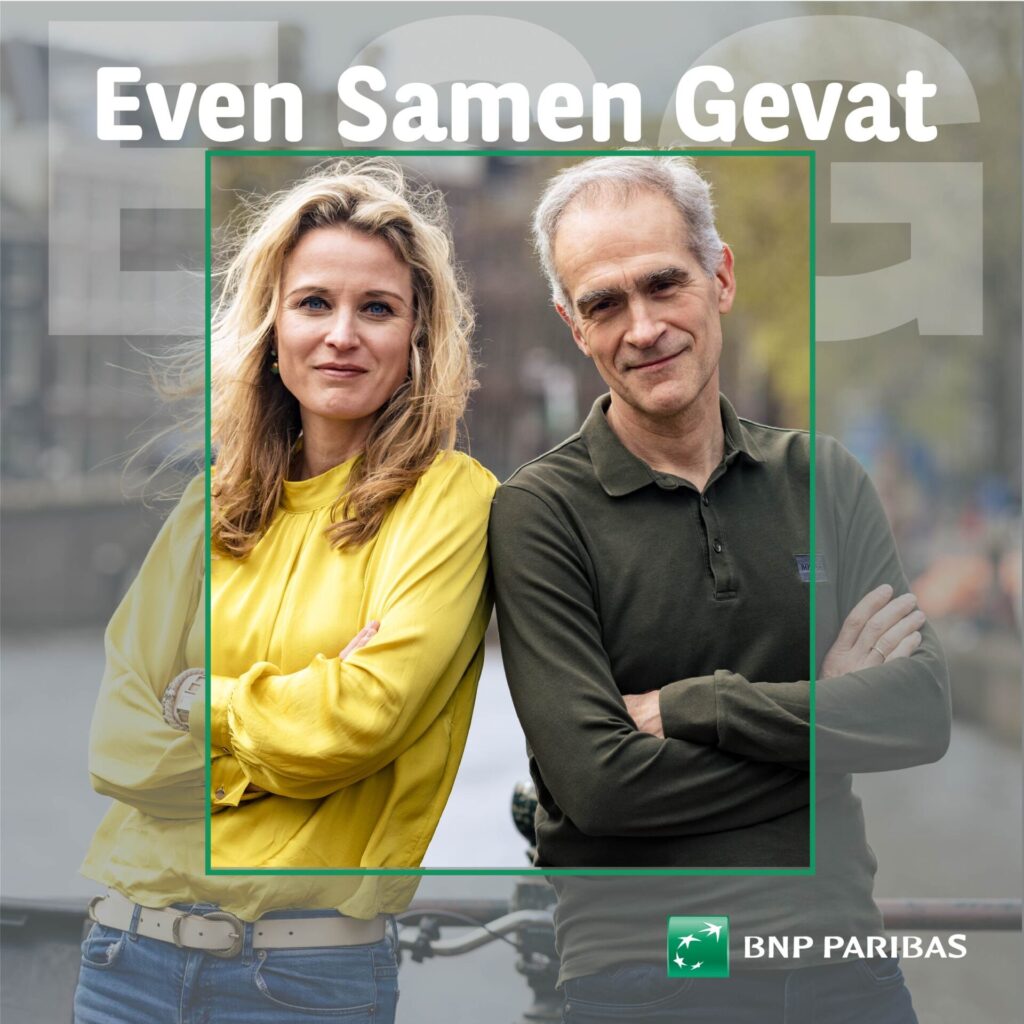In episode 25 of ESG (Even Samen Gevat) Marloes and Aldert speak with Kees Aarts. Kees is the CEO of Protix and author of the book The Footprintarian.
Who is Kees Aarts?
Kees Aarts is a businessman with agriculture in his blood. His grandfather owned a mill, and there are lots of farmers in his family. However, his career initially took off in a completely different direction: he studied aeronautical and aerospace engineering at TU Delft and became a consultant at McKinsey. But that didn’t feel right to him: ‘I’m not really the consultant type. I’m more of a doer.’ So in 2009 he left McKinsey and started his own company with Tarique Arsiwalla. That became Protix, which today has a breeding facility in Bergen op Zoom and its head office in Dongen.
What is Protix, and what does it do?
‘Protix is a company that produces insects on food waste’, says Kees. ‘We take that which is actually at the end of its life, such as vegetable market waste that still contains a lot of protein, fats and other raw materials, and upcycle that into building blocks for food production.’ Those are waste flows from the food industry, such as proteins, spent grain from breweries, potatoes and chips. ‘In nature, insects live on remains and are themselves a highly nutritious source for all kinds of young animals that need to grow. That’s what we emulate in this factory: and end-to-end process to upcycle food waste into proteins, fats and other ingredients.’ In short, to turn food waste into insects and insects into food. Being circular couldn’t get much easier.
As part of their daily work, 180 people at Protix process about 70,000 tonnes of waste flows a year. That makes it the largest insect farm in the world. No small matter – and that’s just the beginning. Kees talks about expanding the existing factory and about new factories in Europe and the US that will be four to five times bigger than the one in Bergen op Zoom. He wants to produce even more buildings blocks for pet food, fish food and chicken feed for the three core regions – Europe, the US and Canada – for the coming five years. And eventually for feeding people, too. Part of that will be achieved by using protein from the larvae of the black soldier fly. Kees says they can be used ‘to produce high-grade proteins’ because they’re very sustainable and quite tasty. Another example is insect oil instead of palm oil. The necessary innovations in this area will ultimately determine how customers respond. The question ‘Where does that come from?’ is becoming increasingly important to people. The more sustainable the food production, the easier it will be to change how people act. And that brings us to the footprintarian.

What is a footprintarian, and what do and don’t they do?
If we want to change the world, we need to take account of consumers. And everybody is a consumer. ‘There’s no such thing as a non-participating consumer’, says Kees. So he came up with the concept of the footprintarian. The mindset of the footprintarian is: ‘I want my way of living to have the smallest possible footprint, and I invite the business community, suppliers and the government to serve me – and all tools are allowed.’ One of those ‘tools’ is taxation: ‘It’s ridiculous that taxes aren’t used more often to reduce one thing and encourage the other.’
A footprintarian is a conscious consumer. ‘I can’t stand careless consumers: people with loads of money who hop into their private jet and say, “Why not!”.’ Kees has much more in common with people who live consciously and say: ‘Look, I have the money, and I do want to enjoy life, but I realise that this is inappropriate.’ Which is why he also believes in a tax system that encourages and discourages people. ‘I think there will always be those people who will do a disappearing act at the mention of a 1% tax increase. You can’t change that, but that doesn’t mean you shouldn’t do it. He’s even willing to go a step further: ‘It’s the people who can actually do something that should be called to account, and if they don’t do anything, then there’s nothing wrong with some extra naming and shaming. So those would be the people who’d been enjoying this culture and society for a long time before that tax increase and then turn their backs when asked to contribute a little more for the next generation.’ People like that need to be ‘dealt with severely’, says Kees. ‘You can also make sure that bad behaviour is discouraged and good behaviour is encouraged. But you shouldn’t pass all the responsibility to the masses, because some of those people are simply unable to bring about that change.’
Are you a footprintarian too?
So change is going to have to come from footprintarians who live consciously and change how they act to keep pace with a changing world. Now you might ask yourself whether you’ve been living consciously enough to be called a footprintarian. Rest assured, there’s a pretty good chance that you fit the profile: ‘As a footprintarian, you’re in search of products, services and goods that make you happy and your footprint even smaller – but actually it’s all about the internal battle. Because there’s actually a little idealist, pragmatic person and activist inside each of us. That’s why we need to be a little lenient to each other. If you realise that most people have these three traits, there’s no need to reproach yourself – and others – for getting on a plane now and then, for instance. ‘Should you write off and condemn a person for taking a plane sometimes? You don’t want to do that’, says Kees. ‘Why not promote train travel instead? People who are pragmatic might start flying a little less as a result, and that will make those idealists a bit more active. It’s really a balance between your internal battles, with an increasingly positive net effect. A footprintarian does things little by little, and it’s innovations like the ones at Protix that will help us on our way.
ESG Even Samen Gevat is a podcast series (in Dutch) in which Aldert Veldhuisen and Marloes Bergevoet talk to accelerators of the sustainable transition. They discuss topics related to the “E”, like green energy, CO2 emissions, raw materials, biodiversity, the “S” of health, diversity and inclusiveness and the “G” such as laws and regulations and international cooperation.
Also published in this series are:
- The energy transition in 10 dilemmas – with Roy op het Veld
- Circular farming in the city – with Minke and Peter van Wingerden
- De energy transition is also geopolitics – with Rob de Wijk
Follow Even Samen Gevat here so you don’t miss an episode!
